This is How Tzu Chi Volunteers Promote Eco-Friendly Agriculture
Journalist : Anand Yahya, Photographer : Anand Yahya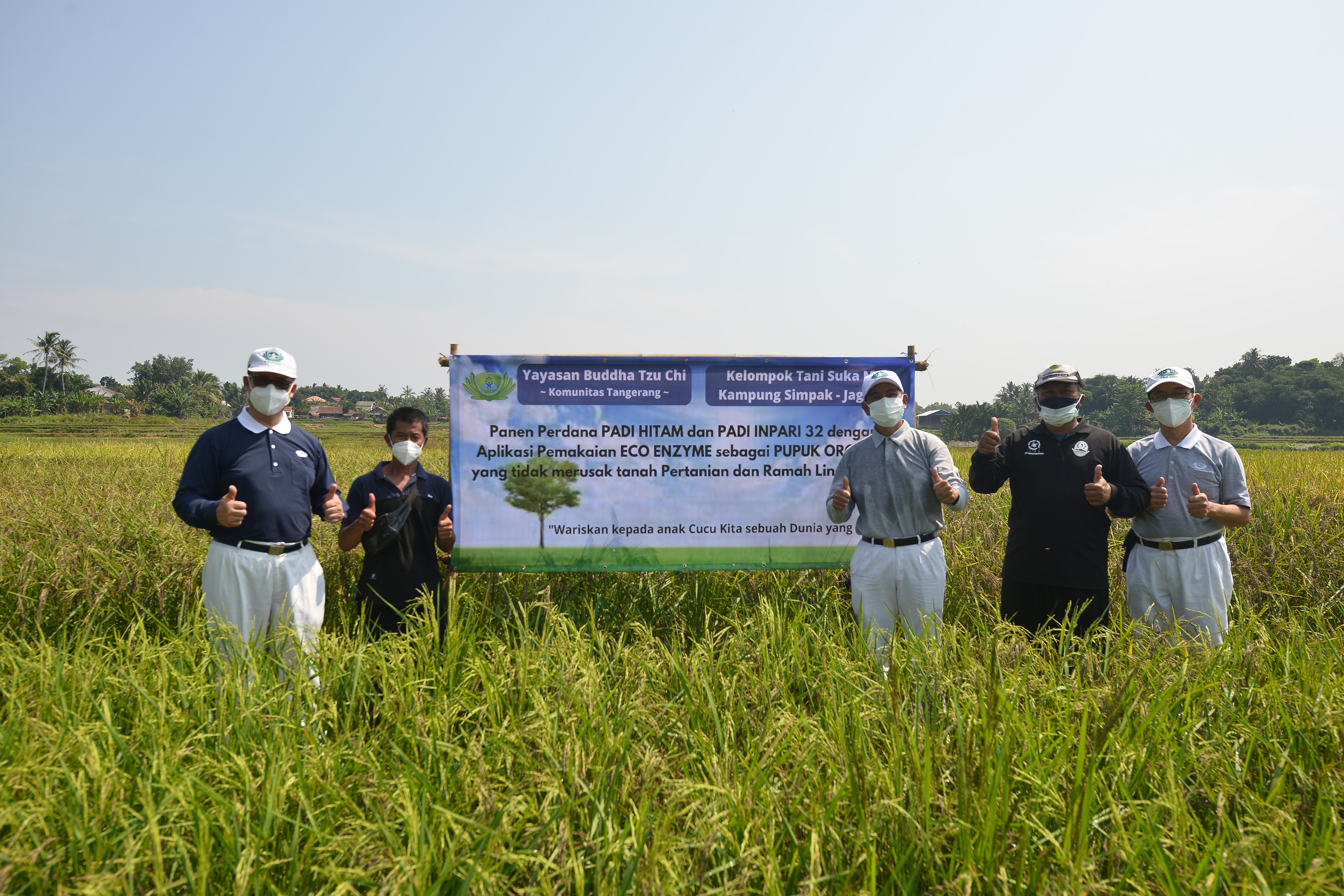
Tzu Chi volunteers took a group photo in the middle of the rice harvest location using eco-enzyme liquid fertilizer. (Left to right: Johnny Chandrina, Wiwi Kristanto, Tzu Chi Tangerang volunteers, Otong Koswara)
Of course, no farmer wants the field he is working on to suffer heavy losses due to pests, weeds, diseases, or other things that cause their crops to wither and die. And during a pandemic like now, it is a very difficult time for all people, so farmers must also minimize mistakes so as not to make their crops fail. They use Plant Destruction Organisms Control (POPT) which is expected to assist farmers in dealing with Plant Destruction Organisms (OPT) in the fields they are working on so as to produce maximum yields.
Economical Eco Enzyme Fertilizer, Bringing Great Benefits to Farmers
Wiwi Kristanto (54) the Suka Maju Farmer's Group, a resident of Simpak Jagabaya Village after receiving directions from Tzu Chi volunteers, wants to try using eco-enzyme fertilizer.
“I was briefed by Tzu Chi volunteers that eco enzyme is environmentally friendly and my advantage of using eco enzyme is very cost effective. Usually, it takes up to 6 sacks of fertilizer and costs more than one million, if I use this eco enzyme, I only pay 200 thousand and the rice yields have been very successful, “said Koh Awi, as his fellow farmers call Wiwi Kistanto.
After seeing the harvest, Koh Awi was not satisfied with this result. This is not the result of using eco-enzyme fertilizers, but due to many factors, such as: poor seeds, weather, rat pests, and lack of water. "After I saw the comparison of rice yields, first of all, it is very economical and the results are almost the same (with those using ordinary fertilizers) but yes, eco enzyme is more profitable because the cost is cheap," said Koh Awi.
Koh Awi really hopes that the Parung Panjang Farmers Group, especially Jagabaya Kampung Simpak, will try eco-enzyme fertilizers.
"We should not depend on chemical fertilizers, because eco-enzyme fertilizers are environmentally friendly, hopefully you will want to try them, don't do it alone, and one more advantage of organic rice is that the price is high compared to rice that uses chemical fertilizers," said Koh Awi.
"I am very grateful to the Tzu Chi volunteers who have helped me, supported me, the energy and thoughts of the Tangerang volunteers came all the way here to nurture me, thank you Tzu Chi, especially the Tangerang volunteers," continued Koh Awi.
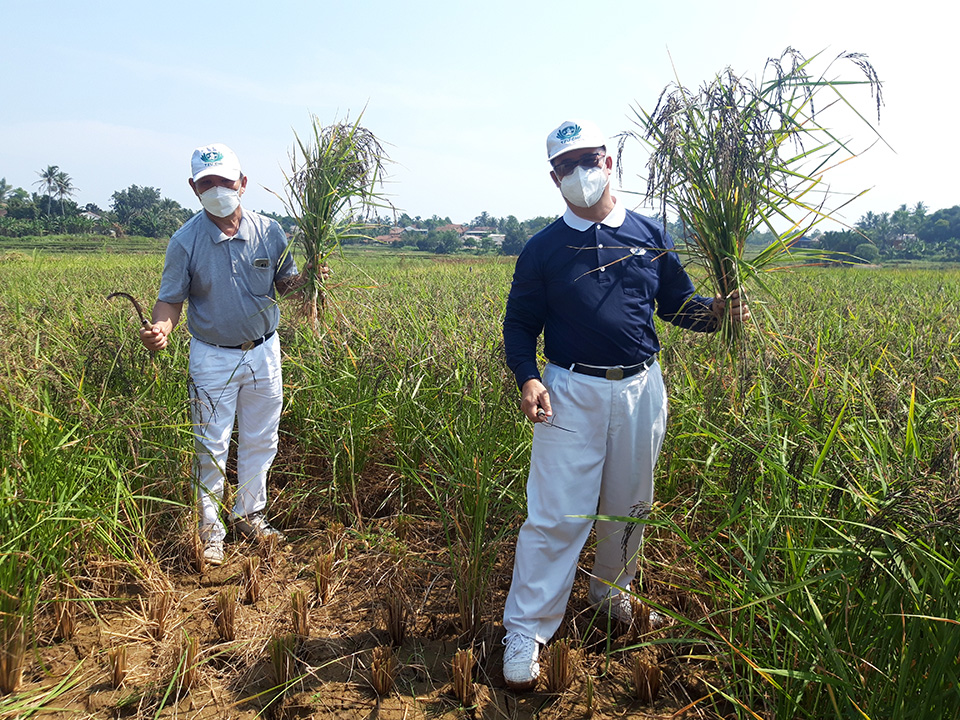
Johnny Chandrina together with Tzu Chi volunteers harvest black rice using organic eco-enzyme fertilizer.
Grateful to know Eco Enzyme
The success of the big harvest using eco-enzyme fertilizer was confirmed by Otong Koswara (53) one of the agricultural service officers from the District Bogor. Otong, Plant Destruction Organism Control (POPT) officer in charge of observing pests, climate, and their effects. Otong is very grateful to Tzu Chi for helping and socializing by introducing eco-enzyme organic fertilizer.
"I saw firsthand the results of Koh Awi's rice harvest after this eco enzyme was applied to rice plants," said Otong.
Otong also assesses the comparison results for rice that does not use eco enzyme and uses eco enzyme. “After I assessed and weighed the results, those who used eco-enzyme had a value of 7.5 and those who did not use eco-enzyme fertilizer were 6.8. So there is a difference in rice yields in one hectare of land," he said.
Otong explained that to produce a good rice harvest, special attention must be paid to control, especially regarding pests, diseases, and climate. Because in the Simpak area, the soil is rainy soil, so the irrigation uses pumped water from the river below.
Otong is very grateful and hopes for Tzu Chi volunteers who have gone directly to the field to socialize eco enzyme fertilizers.
“I hope this eco enzyme can be popular in the community because this eco enzyme is very environmentally friendly. This is an organic system because the materials used are household waste. Indirectly we participate in preserving the environment, "hope Otong.
Otong is also grateful that Tzu Chi volunteers have been willing to advance farmers in terms of farming.
Otang also hopes that Tzu Chi's assistance for farmers will not end here, but will continue their joint efforts in advancing the farmers in Jagabaya Village, Simpak Village.
“I am mainly in Parung Panjang and Tejo sub-districts and in this Jagabaya Village Kp. Simpak, we want in the Bogor area to socialize about eco-enzymes because using eco-enzyme fertilizers are very cheap to plant.
In fact, there is no cost if the farmers want to produce this eco enzyme at home,” said Otong.
Eco Enzyme Application for Farmers
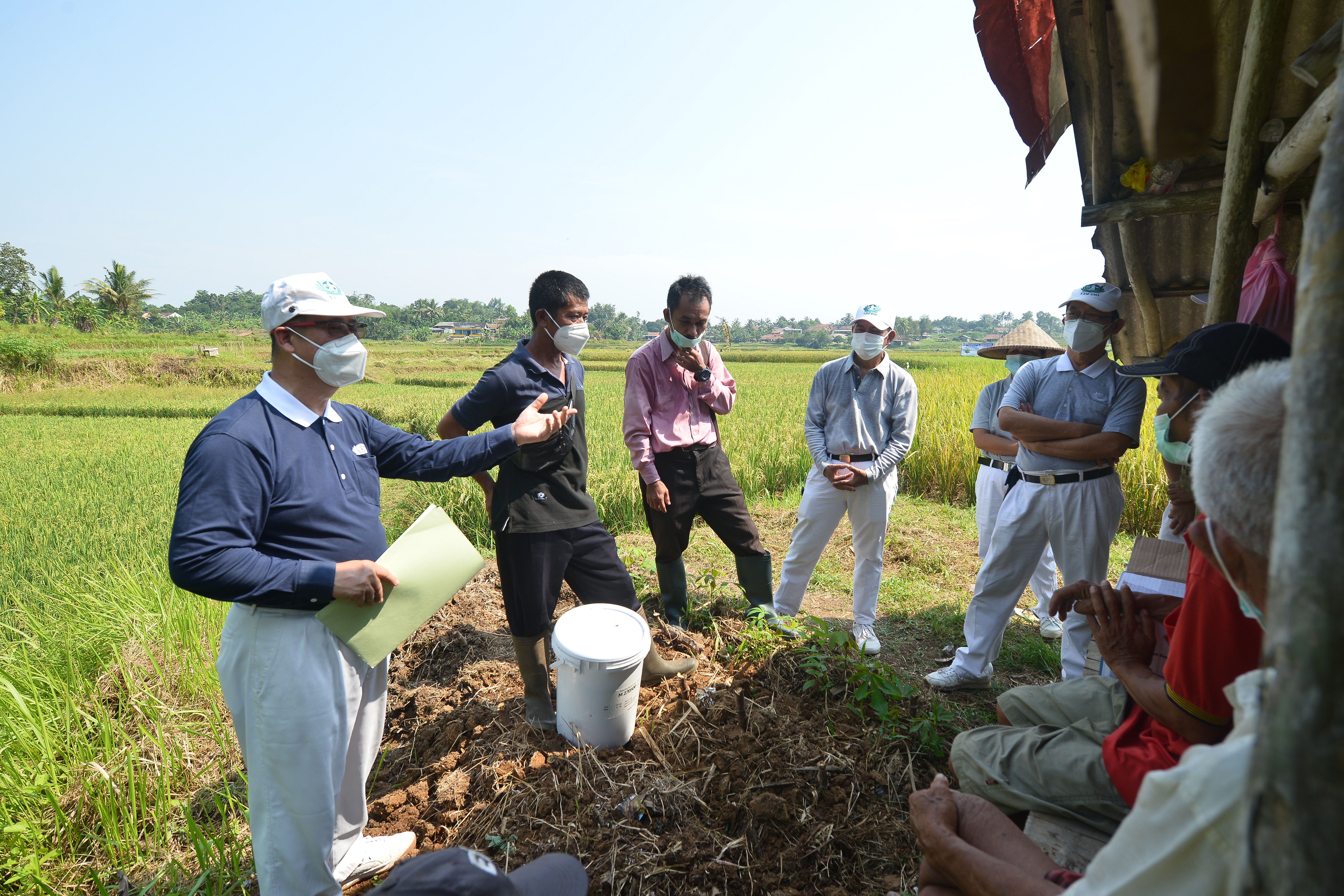
Johnny Chandrina is socializing how to make eco-enzyme liquid fertilizer to the Suka Maju Farmers Group in Simpak Village, Jagabita, Parung Panjang, Bogor.
Johnny Chandrina, a Tzu Chi volunteer and Chairperson of the Tzu Chi community of He Qi Tangerang, explained that Simpak Village is a fostered village of Tzu Chi Tangerang and has implemented eco enzymes in their daily lives.
"We have been socializing this eco enzyme since September 2020, they have indeed made this eco enzyme but its application is only for households," explained Johnny.
As time went on, Johnny saw that the majority of the people in Simpak Village worked as farmers, who a few months ago started the rice planting season.
“Coincidentally, I invited Koh Awi to apply eco enzyme as a rice fertilizer. At first, Koh Awi doubted what would happen if the harvest failed,” recalls Johnny. In his prudence, Johnny convinced Koh Awi by giving some examples and testimonials from farmers who have successfully used eco enzymes.
Koh Awi mencoba dengan padi yang memakai pupuk eco enzyme dan padi yang pakai pupuk urea. Menurut Koh Awi, hasilnya 80 persen berhasil menggunakan pupuk eco enzyme.
Koh Awi tried rice using eco-enzyme fertilizer and rice using urea fertilizer. According to Koh Awi, the results were 80 percent successful using eco-enzyme fertilizers.
"Earlier, we heard from Otong Koswara, an officer of the District Bogor Agricultural Service Office in the field of POPT with very limited varieties of black rice. After being weighed, the results were very good, it was calculated with an area of one hectare which usually produces 3 tons of rice, however, after weighing the results can be 4 tons in one hectare, "said Johnny.
Johnny explained that this type of Inpari 32 rice yielded 5.2 tons. This result is still below the national standard; however, this is due to the factors of old seeds, loose spacing and weather influences. However, even though the results are less than optimal due to several factors, this rice does not use chemical fertilizers. Chemical fertilizers are quite expensive, while eco-enzyme fertilizers cost very little.
"So the first benefit is that the cost is very small and the results are quite maximal. Secondly, the land here is not polluted by chemical solutions," said Johnny. "I saw that there were ladybugs on the rice stalks, this indicates that this rice does not use chemical fertilizers," Johnny continued.
In many cultures, ladybugs are considered a good luck charm for farmers. Many farmers like the presence of ladybugs on their crops, because these animals eat aphids and plant -eating pests.
Rice Harvest Festival with Suka Maju Farmer Groups
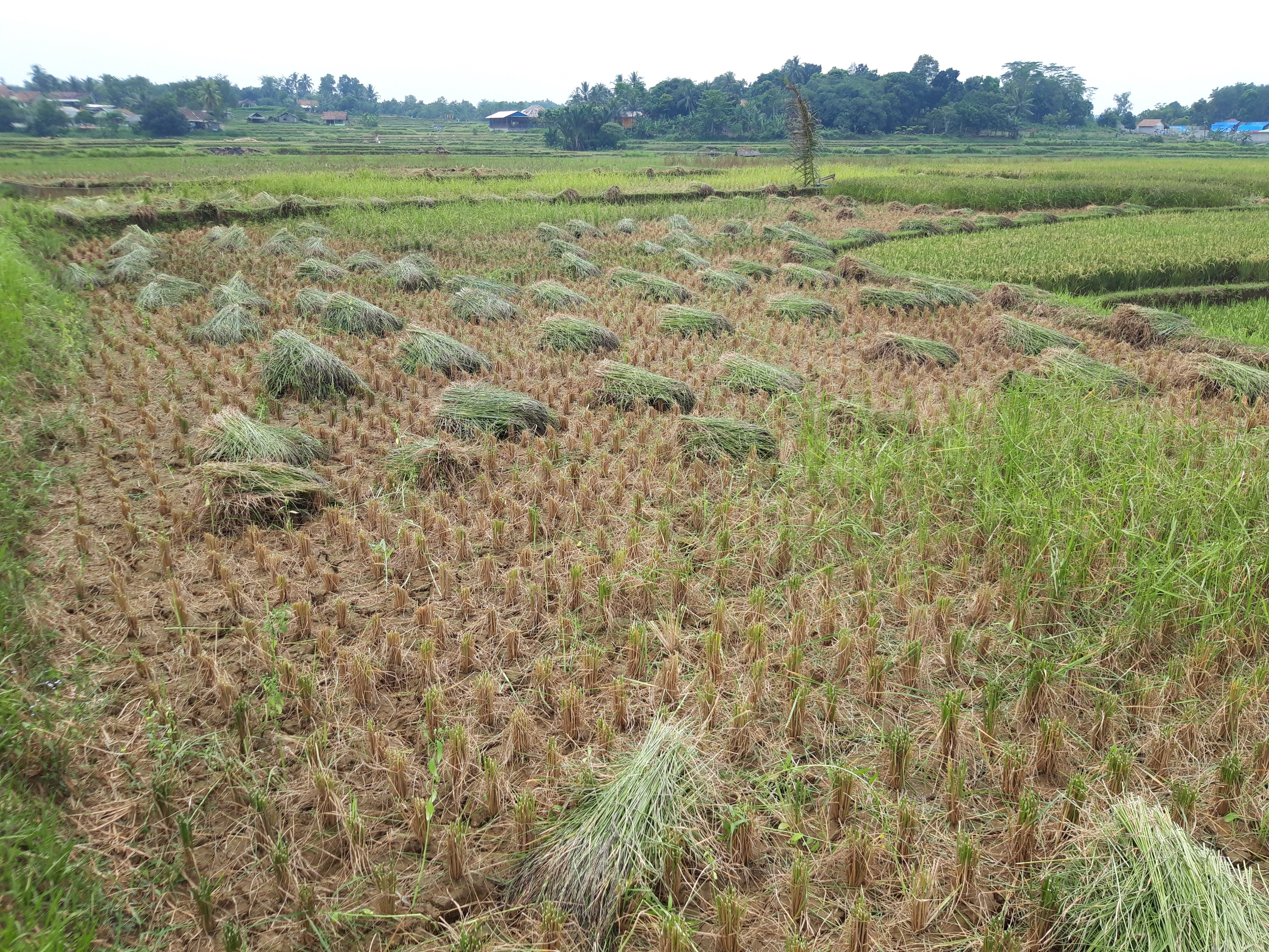
The Suka Maju farmers cut the yellowed rice in several plots of rice fields. The rice is ready to be milled to be marketed.
Currently, not many farmers in Simpak Village know about eco enzyme, but indeed some are already using VOC (liquid organic fertilizer).
"Seeing the results of the rice harvest that uses eco-enzyme and uses chemical fertilizers, it seems that they are quite satisfied with the results that use eco-fertilizers," said Johnny. "I hope that all the farmers in Jagabita will use eco-enzyme fertilizer because we all know that our environment is very polluted and that if humans eat organic food it will be very good," he said.
On September 1, 2021, Tzu Chi Tangerang volunteers were invited to participate in the Rice Harvest Festival with the Suka Maju Farmers Group because some farmers, including Koh Awi, use eco-enzyme fertilizers.
"Today, the five of us were invited by farmers in Simpak Village to harvest black rice and white rice because some of these farmers use eco-enzyme fertilizer, so they invited Tzu Chi volunteers," explained Johnny.
In the future, for the first step, Tzu Chi volunteers will help send eco enzymes to farmers because the production of eco enzymes takes more than 3 months.
"Later on, we hope that farmers will make their own because the purpose of this eco enzyme is to reduce organic kitchen waste in our households before going to the landfill, this is important," said Johnny.
Lastly, Johnny and volunteers from Tzu Chi Tangerang are trying to market the agricultural products of the Suka Maju Farmer Group because this is a Tzu Chi Village fostered in Tangerang. "So indirectly Tzu Chi volunteers help the farmers' economy with better prices because this is organic rice," concluded Johnny. Editor: Metta Wulandari
Translator: Indah Melati (Tzu Chi Volunteers)
Related Articles
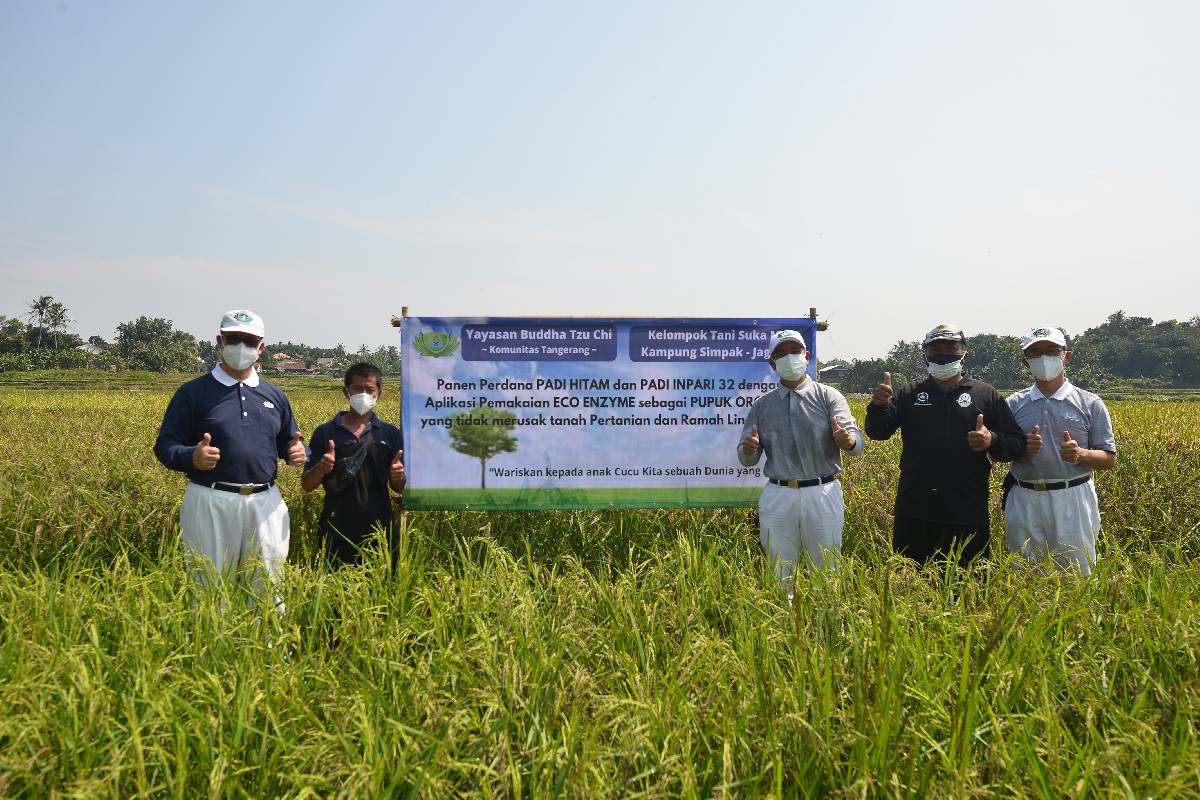
This is How Tzu Chi Volunteers Promote Eco-Friendly Agriculture
October 06, 2021The success of the big harvest using eco-enzyme fertilizer was confirmed by Otong Koswara (53) one of the agricultural service officers from the District Bogor. Otong is very grateful to Tzu Chi for helping and socializing by introducing eco-enzyme organic fertilizer.








 Sitemap
Sitemap